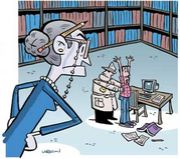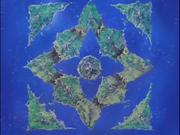March 8, 2005
BOOKS OF THE TIMES | 'THE FACE OF A NAKED LADY'
A Son Learns to Look at Life, His Invisible Father as a Lens
By MICHIKO KAKUTANI
THE FACE OF A NAKED LADY
An Omaha Family Mystery
By Michael Rips
192 pages. Houghton Mifflin. $24.
There are two simplistic ways to stereotype the great middle part of this country: condescend to it as red state, flyover land, a place, in the words of one man quoted in Michael Rips's intriguing new memoir, that is "white, docile, and middle class"; or turn that cliché inside out to depict it as the birthplace of American Gothic, a place whose placid façade (like that of Lumberton in David Lynch's "Blue Velvet") conceals all manner of darkness and desperation and oddity. The second is the approach embraced by Michael Lesy's unnerving photographic essay "Wisconsin Death Trip" and by the Coen Brothers' uproarious movie "Fargo." It's also the approach taken by Mr. Rips in "The Face of a Naked Lady."
The Omaha depicted in these pages seems less like an American city circa mid-20th century than a surreal landscape glimpsed through the phantasmagorical scrim of magical realism. Here, the weird and weirder proliferate with abandon: a water-logged corpse falls through the ceiling of a coffee shop; a plumber kills and dismembers a customer, hiding the body parts around the house; a circus performer plunges off the high wire and breaks her neck in front of an audience full of children; a man is caught having sex with a chicken by his family, which proceeds to cook and serve the ravished bird for dinner; another man courts women with his dancing skills - and a fake penis tied around his cowboy boot.
Mr. Rips, the author of an earlier book titled "Pasquale's Nose," tries too hard to focus on the bizarre in this volume, often failing to ground his more hallucinatory images and anecdotes (which the reader sometimes suspects him or his interview subjects of having heightened or embroidered, if not entirely imagined) in a recognizable reality. When he relaxes and focuses on his own highly eccentric family, however, the results are far more affecting - reminiscent of the powerful images of loneliness and alienation found in Sherwood Anderson's classic "Winesburg, Ohio." They are images that have less to do with stereotypes about one part of the country or another than with the human condition in its peculiarly American manifestation.
In fact, "The Face of a Naked Lady" is at its most powerful as a son's search for his father, a man, the author realizes, he never remotely knew. To the world, Nick Rips was "Republican, affluent, and content" - the well-to-do owner of an optical factory, an executive who wore bespoke suits and perfectly starched shirts, a habitué of Omaha's steakhouses, a weekend golfer, a man known for his imperturbable calm. Following his father's death, Mr. Rips returned to his family home, where he discovered a hidden portfolio of paintings: each of the paintings depicted a naked black woman, and each bore the initials of his father.
The paintings spurred Mr. Rips on a Telemachus-like quest to understand his father - to uncover his secret life and deconstruct his past. He hires a local detective (another oddball seemingly exiled from a David Lynch or Coen brothers' film) who suggests using a "brain machine" to decode the mystery and who apparently shares Nick Rips's predilection for contemplating black women in the nude. Mr. Rips also begins interviewing every family member and friend of his father's he can find.
In recounting his search, Mr. Rips intercuts childhood memories with present-day sleuthing, family reminiscences with philosophical digressions, and from his sad-funny-elliptical account, his father emerges as a shockingly negligent parent, so emotionally removed that he apparently took zero interest in his children's lives.
"With his sons growing up," Michael Rips writes, "Father assumed an amiable apathy that he would maintain without interruption for the rest of his life. At no point did he think to play with his sons, take them out in the yard, teach them a sport, attend school activities, or, as we grew older, inquire about our jobs or even the women whom we dated or married. He was there with us but was transparent." The younger Mr. Rips aspires as a boy to follow his father "into oblivion"; he wants to make himself "into a figure that could exist anywhere, never give offense, know exactly what to say so that people would ignore me, deferring to all semisolid objects, thoughts, personalities."
During his high school years, the author says he spent increasing amounts of time with his father: "Not that we spoke. He would read the newspaper, I would scribble notes to myself, time would pass. Once or twice he would look up and ask me a question ('The Mauro Castle, does it mean anything to you?') or recite something from memory (" 'what age so large a crop of vices bore? Or when was avarice extended more?' ")." Once his father turned to him and said he had something to say in a tone that "suggested he was about to take me into his confidence." This was his revelation: "Michael," he said, "as you go through life eating Reubens, there will be people who will tell you that it was invented in New York. Don't believe them. It came from Omaha."
Michael Rips recounts that he slowly turned up clues to his father's past. He learns that his father spent a lot of time as a boy in the hotel his grandparents ran - a hotel that was actually a brothel. He learns that his father developed a childhood fascination with Omaha's raffish world of gamblers and bootleggers. He learns that his father was the first among his circle in high school to drink, to smoke and to have sex. He learns that his father wanted to become a writer and leave Omaha, but returned home from college to take over the family's optical factory. And he learns that his father objected to World War II on aesthetic grounds - "he did not, he told me, like the uniforms, even less the idea of sleeping in a tent" - and that he never spoke of his brother Leonard, who was killed on the European front in 1944.
Michael Rips's questioning of his father's relatives and friends and his reconstruction of pivotal scenes from his father's life gradually come together like a collage to form a "Citizen Kane"-like picture of his elusive and withholding progenitor. He eventually does find the woman his father painted, but by this time he seems less interested in trying to explicate his father's life than in embracing a philosophical stance that embraces the unfathomable and eschews conventional notions of identity. Indeed there is ultimately no Rosebud moment in this unsettling memoir, no single moment that unravels the mystery of this alarming father and most peculiar man.
http://
BOOKS OF THE TIMES | 'THE FACE OF A NAKED LADY'
A Son Learns to Look at Life, His Invisible Father as a Lens
By MICHIKO KAKUTANI
THE FACE OF A NAKED LADY
An Omaha Family Mystery
By Michael Rips
192 pages. Houghton Mifflin. $24.
There are two simplistic ways to stereotype the great middle part of this country: condescend to it as red state, flyover land, a place, in the words of one man quoted in Michael Rips's intriguing new memoir, that is "white, docile, and middle class"; or turn that cliché inside out to depict it as the birthplace of American Gothic, a place whose placid façade (like that of Lumberton in David Lynch's "Blue Velvet") conceals all manner of darkness and desperation and oddity. The second is the approach embraced by Michael Lesy's unnerving photographic essay "Wisconsin Death Trip" and by the Coen Brothers' uproarious movie "Fargo." It's also the approach taken by Mr. Rips in "The Face of a Naked Lady."
The Omaha depicted in these pages seems less like an American city circa mid-20th century than a surreal landscape glimpsed through the phantasmagorical scrim of magical realism. Here, the weird and weirder proliferate with abandon: a water-logged corpse falls through the ceiling of a coffee shop; a plumber kills and dismembers a customer, hiding the body parts around the house; a circus performer plunges off the high wire and breaks her neck in front of an audience full of children; a man is caught having sex with a chicken by his family, which proceeds to cook and serve the ravished bird for dinner; another man courts women with his dancing skills - and a fake penis tied around his cowboy boot.
Mr. Rips, the author of an earlier book titled "Pasquale's Nose," tries too hard to focus on the bizarre in this volume, often failing to ground his more hallucinatory images and anecdotes (which the reader sometimes suspects him or his interview subjects of having heightened or embroidered, if not entirely imagined) in a recognizable reality. When he relaxes and focuses on his own highly eccentric family, however, the results are far more affecting - reminiscent of the powerful images of loneliness and alienation found in Sherwood Anderson's classic "Winesburg, Ohio." They are images that have less to do with stereotypes about one part of the country or another than with the human condition in its peculiarly American manifestation.
In fact, "The Face of a Naked Lady" is at its most powerful as a son's search for his father, a man, the author realizes, he never remotely knew. To the world, Nick Rips was "Republican, affluent, and content" - the well-to-do owner of an optical factory, an executive who wore bespoke suits and perfectly starched shirts, a habitué of Omaha's steakhouses, a weekend golfer, a man known for his imperturbable calm. Following his father's death, Mr. Rips returned to his family home, where he discovered a hidden portfolio of paintings: each of the paintings depicted a naked black woman, and each bore the initials of his father.
The paintings spurred Mr. Rips on a Telemachus-like quest to understand his father - to uncover his secret life and deconstruct his past. He hires a local detective (another oddball seemingly exiled from a David Lynch or Coen brothers' film) who suggests using a "brain machine" to decode the mystery and who apparently shares Nick Rips's predilection for contemplating black women in the nude. Mr. Rips also begins interviewing every family member and friend of his father's he can find.
In recounting his search, Mr. Rips intercuts childhood memories with present-day sleuthing, family reminiscences with philosophical digressions, and from his sad-funny-elliptical account, his father emerges as a shockingly negligent parent, so emotionally removed that he apparently took zero interest in his children's lives.
"With his sons growing up," Michael Rips writes, "Father assumed an amiable apathy that he would maintain without interruption for the rest of his life. At no point did he think to play with his sons, take them out in the yard, teach them a sport, attend school activities, or, as we grew older, inquire about our jobs or even the women whom we dated or married. He was there with us but was transparent." The younger Mr. Rips aspires as a boy to follow his father "into oblivion"; he wants to make himself "into a figure that could exist anywhere, never give offense, know exactly what to say so that people would ignore me, deferring to all semisolid objects, thoughts, personalities."
During his high school years, the author says he spent increasing amounts of time with his father: "Not that we spoke. He would read the newspaper, I would scribble notes to myself, time would pass. Once or twice he would look up and ask me a question ('The Mauro Castle, does it mean anything to you?') or recite something from memory (" 'what age so large a crop of vices bore? Or when was avarice extended more?' ")." Once his father turned to him and said he had something to say in a tone that "suggested he was about to take me into his confidence." This was his revelation: "Michael," he said, "as you go through life eating Reubens, there will be people who will tell you that it was invented in New York. Don't believe them. It came from Omaha."
Michael Rips recounts that he slowly turned up clues to his father's past. He learns that his father spent a lot of time as a boy in the hotel his grandparents ran - a hotel that was actually a brothel. He learns that his father developed a childhood fascination with Omaha's raffish world of gamblers and bootleggers. He learns that his father was the first among his circle in high school to drink, to smoke and to have sex. He learns that his father wanted to become a writer and leave Omaha, but returned home from college to take over the family's optical factory. And he learns that his father objected to World War II on aesthetic grounds - "he did not, he told me, like the uniforms, even less the idea of sleeping in a tent" - and that he never spoke of his brother Leonard, who was killed on the European front in 1944.
Michael Rips's questioning of his father's relatives and friends and his reconstruction of pivotal scenes from his father's life gradually come together like a collage to form a "Citizen Kane"-like picture of his elusive and withholding progenitor. He eventually does find the woman his father painted, but by this time he seems less interested in trying to explicate his father's life than in embracing a philosophical stance that embraces the unfathomable and eschews conventional notions of identity. Indeed there is ultimately no Rosebud moment in this unsettling memoir, no single moment that unravels the mystery of this alarming father and most peculiar man.
http://
|
|
|
|
コメント(1)
a water-logged corpse falls through the ceiling of a coffee shop; a plumber kills and dismembers a customer, hiding the body parts around the house; a circus performer plunges off the high wire and breaks her neck in front of an audience full of children; a man is caught having sex with a chicken by his family, which proceeds to cook and serve the ravished bird for dinner; another man courts women with his dancing skills - and a fake penis tied around his cowboy boot.
水分で膨張した死体がコーヒーショップの天井から垂れ下がっている。配管工が顧客を殺してバラバラにした死体を家の周りに隠す。子供がたくさんいる観客の前で、綱渡りのサーカス団員がロープから滑り落ちて首の骨を折る。鶏と性交をした男が家族に捕まえられるが、家族はその鶏を夕食のために料理する。ダンス上手な男が女性たちにダンスの技術を使って言い寄る。そのカウボーイブーツに巻かれた偽物のペニス……
こういうビザールな背景の‘父親探し’の追想録とのことです。
"Republican, affluent, and content" な、ごく一般的なアメリカ中部の男だった父。しかし死後に、父が描いた数点の見知らぬ黒人女性の裸体画が発見される。著者はその謎を解明するために、父の子供時代にまで翻って足跡を追うが…という粗筋だそうです。
私がこの本をいいなと思ったのは、裸体画が、Kakutaniさん曰く「市民ケーン」の‘rose bud’みたいなトリックなのに、rose budとは違い、絵画の意味はラストでもはっきりとは解明されず、父に関する謎が中途半端なままにされるという点。いつも傍に居たのに、実は、ほとんど知らなかった父という人間の核心を掴めそうで掴めないところで追想録が終わっているらしいというところ。
そして、"white, docile, and middle class"という常套句で表現されるアメリカ中部を、American Gothicの誕生地として、その静けさの下にある、不穏を描いているという点。
デイビッド・リンチやコーエン兄弟の映画に出てくるような変な人たちが登場し、都市Omahaをmagical realismの小説のようにどこか架空の街みたく描いているそうです。Kakutaniさんは「ちょっとやり過ぎ」とも言ってますが、そんな雰囲気が好きな人には合うかもしれないですね。
ちなみに私は著者の名前を初めて知りました。この本が2作目の新人さんのようです。
Michael Rips is a 5th generation Nebraska native. He now lives at the Chelsea Hotel in New York City. This(PASQUALE'S NOSE Idle Days in an Italian Town) is his first book
水分で膨張した死体がコーヒーショップの天井から垂れ下がっている。配管工が顧客を殺してバラバラにした死体を家の周りに隠す。子供がたくさんいる観客の前で、綱渡りのサーカス団員がロープから滑り落ちて首の骨を折る。鶏と性交をした男が家族に捕まえられるが、家族はその鶏を夕食のために料理する。ダンス上手な男が女性たちにダンスの技術を使って言い寄る。そのカウボーイブーツに巻かれた偽物のペニス……
こういうビザールな背景の‘父親探し’の追想録とのことです。
"Republican, affluent, and content" な、ごく一般的なアメリカ中部の男だった父。しかし死後に、父が描いた数点の見知らぬ黒人女性の裸体画が発見される。著者はその謎を解明するために、父の子供時代にまで翻って足跡を追うが…という粗筋だそうです。
私がこの本をいいなと思ったのは、裸体画が、Kakutaniさん曰く「市民ケーン」の‘rose bud’みたいなトリックなのに、rose budとは違い、絵画の意味はラストでもはっきりとは解明されず、父に関する謎が中途半端なままにされるという点。いつも傍に居たのに、実は、ほとんど知らなかった父という人間の核心を掴めそうで掴めないところで追想録が終わっているらしいというところ。
そして、"white, docile, and middle class"という常套句で表現されるアメリカ中部を、American Gothicの誕生地として、その静けさの下にある、不穏を描いているという点。
デイビッド・リンチやコーエン兄弟の映画に出てくるような変な人たちが登場し、都市Omahaをmagical realismの小説のようにどこか架空の街みたく描いているそうです。Kakutaniさんは「ちょっとやり過ぎ」とも言ってますが、そんな雰囲気が好きな人には合うかもしれないですね。
ちなみに私は著者の名前を初めて知りました。この本が2作目の新人さんのようです。
Michael Rips is a 5th generation Nebraska native. He now lives at the Chelsea Hotel in New York City. This(PASQUALE'S NOSE Idle Days in an Italian Town) is his first book
- mixiユーザー
- ログインしてコメントしよう!
|
|
|
|
Michiko Kakutani 更新情報
-
最新のイベント
-
まだ何もありません
-
-
最新のアンケート
-
まだ何もありません
-
Michiko Kakutaniのメンバーはこんなコミュニティにも参加しています
人気コミュニティランキング
- 1位
- 十二国記
- 23163人
- 2位
- 楽天イーグルス
- 31952人
- 3位
- 北海道日本ハムファイターズ
- 28124人
























